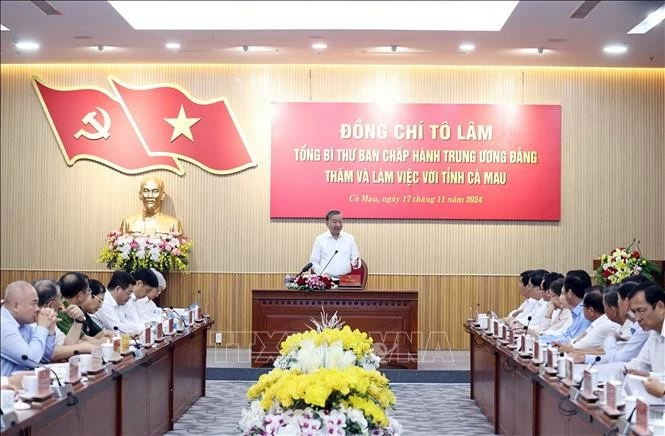
Party leader To Lam asks Ca Mau to remove obstacles to development
Latest
 |
| Party General Secretary To Lam speaks at the meeting. |
Ca Mau should focus on implementing priority solutions to ensure growth in tandem with protecting the environment and promoting social welfare, the leader said.
He urged the province to further optimise its geo-economic position, and pay more attention to planning and infrastructure, particularly transport infrastructure.
The leader said Ca Mau, Can Tho city, and Kien Giang and An Giang province form the Mekong Delta key economic region. Therefore, Ca Mau should maximise its unique potential, outstanding opportunities, and advantages in sea, island, and mangrove ecosystem, while strengthening cooperation and fostering linkage with the three localities and others in strategic planning and resource mobilisation during development.
People and businesses should be put at the centre, he said, asking Ca Mau to focus on administrative reform, digital transformation, and green transition in a harmonious and comprehensive manner across both the public and private sectors.
The Party chief highlighted the need to improve the local investment and business environment, raise the province's competitiveness, and invest more in education and health care.
Building the Party and strengthening the great national unity bloc remain regular tasks, he continued, asking Ca Mau to review the implementation of its tasks and targets set for 2021 – 2024.
On this occasion, he presented medical equipment to the Song Doc regional general clinic in Tran Van Thoi district, Ca Mau province.
According to a report presented at the meeting, Ca Mau’s economy is recovering, with its Gross Regional Domestic Product (GRDP) projected to grow by approximately 6.53%.
Its economic scale has increased 1.4-fold compared to that in 2020. The province’s per capita GRDP is estimated at 72.6 million VND (2,589 USD) per year (up 36.2% from 2020), and the economic structure is shifting in the right direction. Ca Mau leads the country in shrimp export value.
By the end of 2024, the province is expected to have 64 out of 82 communes meeting new-style rural standards, with 10 communes recognised as advanced new-style rural areas. Its poverty rate has decreased by an average of 0.56% annually, with only 0.95% of households now classified as poor.

















